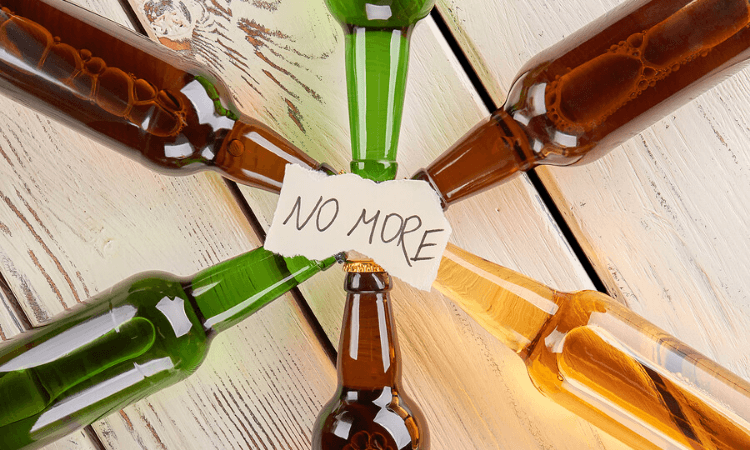
Benefits of Not Drinking Alcohol – For many, quitting drinking may seem like a daunting task, and it’s especially difficult for those who are dependent. Alcoholics often feel as if life cannot continue without alcohol, or that it is needed to enjoy life. And despite all of the negative effects it wreaks on many areas of their lives, they continue to drink.
Fortunately, however, countless people have shown that achieving abstinence is possible, and, over time, the benefits of not drinking alcohol become pronounced. Through long-term sobriety, people have been able to improve their lives in unlimited ways.
The Many Benefits of Not Drinking
Feeling Better
Alcohol isn’t a healthy substance—it is a toxin. When a person drinks alcohol to excess, the body is forced to work harder to process it. The liver can be pushed to its limit attempting to break it down, as the brain struggles to restore equilibrium, and the heart pumps at an irregular rate.
People who don’t drink or drink minimally tend to be healthier in a variety of ways. They aren’t vulnerable to alcohol’s effects on the body., and because their system is free from toxins, it can concentrate its efforts elsewhere. As a result, the mind and body function optimally.
Drinking is detrimental to mental health, as well. Heavy drinking often leads people to make choices they regret later. Thus, alcohol abuse is often associated with guilt, shame, and remorse. Over time, this can be destructive to a person’s emotional health. In fact, one of the most significant benefits of not drinking alcohol is the elimination of guilt.
Looking Younger
Excessive, prolonged alcohol use tends to make people appear older than they actually are. Alcohol is a diuretic, which means that it dehydrates the body, causing drier skin that loses its elasticity quicker than it otherwise would.
It also causes inflammation in the body’s tissues, and this is why some people experience flushing in the face when they drink. Initially, the redness may dissipate once alcohol leaves their system, but eventually, constant inflammation will damage their skin and become more permanent.
Alcohol can also reduce levels of collagen, which is a protein that connects skin cells and strengthens the tissue. As it breaks down, the skin starts to appear more loose and saggy.
Saving Money
The benefits of quitting drinking aren’t just physical—there are financial benefits, as well. Anyone who drinks regularly is well aware that the cost of alcoholism can quickly add up. When purchased occasionally, the price of a couple of beers or a bottle of wine may be only a few dollars. But, when someone drinks daily, the costs accumulate over time, possibly into the thousands of dollars per year.
Also, ill-informed decisions often accompany drinking. If any legal problems such as being charged with drinking and driving occur, the cost can be enormous. Alcoholics in recovery are usually quite happy to discover that their wallets are much fatter after quitting.
Losing Weight

Alcohol is high in calories, and these calories offer little nutritional value. The body processes and retains alcohol as sugar, which is eventually converted into and stored as fat. People who drink heavily often weigh more than those who drink occasionally or not at all. In fact, studies have shown that excessive alcohol use is linked to obesity. The more a person drinks, the more likely it is that they’ll carry extra unwanted weight.
Of course, some people have higher metabolisms than others, and activity levels vary and can play a significant role in how much a person weighs. Thus, there is not necessarily a direct association between a person’s weight and the amount of alcohol they consume. But if a person is looking to lose some excess weight, abstaining from alcohol is a good start.
New Activities and Hobbies
Drinking itself takes up a significant amount of time, and when you add day-slowing hangovers, you will probably find you have more time to be productive after you quit drinking. Therefore, discovering a new hobby or activity (or renewed interest in an old one) is vital for maintaining sobriety.
Some former alcoholics turn to exercise, and some prefer to paint, garden, or play golf. It’s not terribly important what the hobby or activity is, as long as it gives the person something enjoyable to do to occupy themselves and the time they would otherwise waste on drinking.
Healthy Liver Functioning
Heavy alcohol consumption is notoriously harmful to the liver. When a person drinks to excess, the liver must exhaust itself to process it. In severe cases, alcoholics can develop liver diseases, such as fatty liver, hepatitis, or cirrhosis. These conditions can lead to both internal and external damage to the body, and liver cirrhosis is extremely serious and irreversible.
The liver, however, is a regenerating organ and can often repair itself when it’s given an adequate amount of time to do so. It creates new cells with the purpose to fix problems that arise. Alcohol weakens the regenerative system, however, and when used in excess, the liver has a harder time regenerating.
With prolonged alcohol consumption, over time, the liver may decline in functioning and become fatty, inflamed, and scarred. To prevent existing damage from getting worse, alcohol abusers should stop drinking and give their liver time to recover.
When a person quits drinking, their liver will begin to flush out the leftover toxic byproducts produced over time. This process can take several weeks, but in extreme cases, may take as long as a few years. After the byproducts have cleared, the liver can be restored to normal functioning.
Unfortunately, some types of liver damage, such as cirrhosis, are irreversible. In most cases, however, those who decide to abstain from drinking will notice the benefits of not drinking alcohol within a few months.
Making Amends and Righting Wrongs
Most people have done things that they feel ashamed of and regret, but heavy drinkers tend to engage in even more lamentable behavior. One of the greatest benefits of quitting alcohol is having the opportunity to apologize for past transgressions. Sobriety gives people the chance to make amends for their wrongs and start anew.
Alcoholics often behave in ways that cause conflict with family or friends, who often respond by distancing themselves. But, when the person quits drinking, this is concrete proof that he or she is taking steps toward becoming a better person.

Improved Sleep
According to the National Sleep Foundation, alcohol use can ultimately interfere with quality sleep, despite its depressant effects. According to sleep experts, alcohol use represses REM sleep, can exacerbate breathing problems, and can result in an increased need to urinate and frequent bathroom trips. The benefits of not drinking alcohol, therefore, include a better night’s sleep with feelings of restfulness and increased energy the next day.
Treatment for Alcoholism
Many people find it challenging to quit drinking on their own. Most addiction professionals recommend that those who are dependent on alcohol enroll in a comprehensive treatment program that focuses on evidence-based services, such as cognitive-behavioral therapy, psychoeducation, counseling, group support, and aftercare planning.
Recovery in Tune employs highly-trained specialists in addiction who deliver these services to each client with compassion and expertise. We provide our clients with the tools, resources, and support they need to achieve sobriety, prevent relapse, and enjoy long-lasting health and well-being.
If you are struggling with alcohol addiction, please contact us as soon as possible to find out how we can help you get started on your journey to recovery!